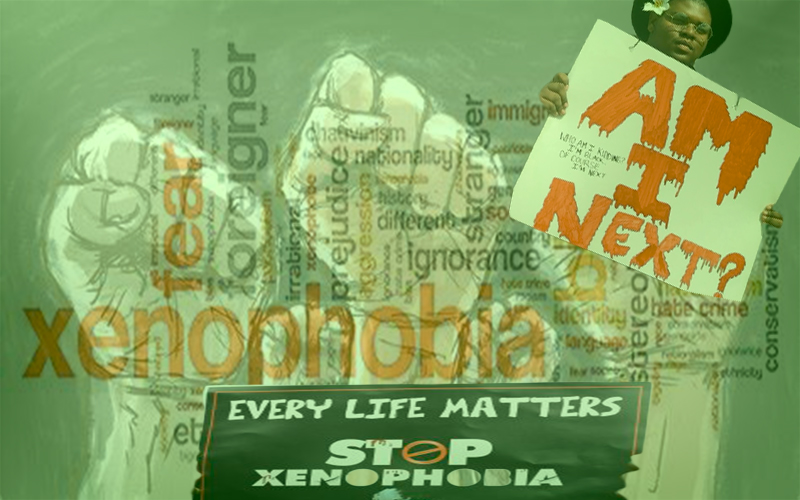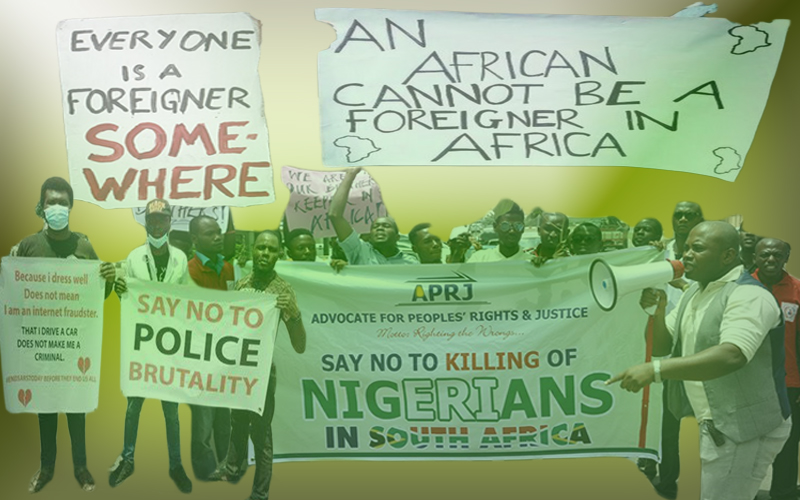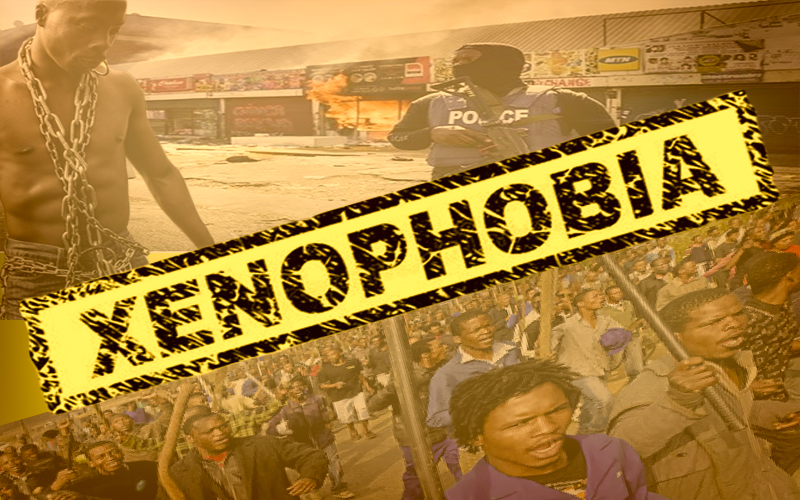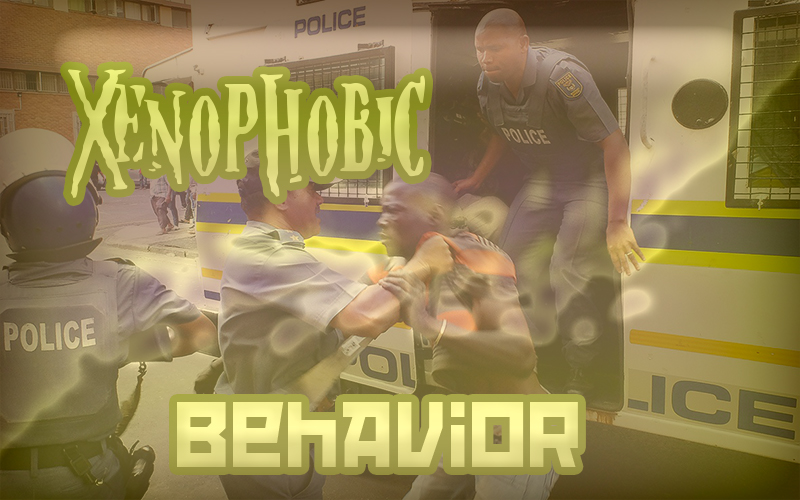 There is an added hurdle to being positioned in society as a ‘nonperson’, visibly invisible to the majority of society, when you live on the street. The issue of xenophobia or racism based on ethnic, cultural and tribal differences is a constant background murmur that the dwellers on the street are never far from and are always aware of, especially if they are not from the indigenous racial/tribal groups that make up South Africa. This is true globally as Africans in the European Union and the United States of America can testify (there is much media coverage of this over decades) and today’s new influx of immigrants from Africa, the Middle East and of course Ukraine can add their voices to the ongoing divide between ‘them and us’ where ‘them’ is the immigrants and ‘us’ is the native citizens of whichever country the immigrants are in. It should be noted that among the most vociferous anti-immigrant voices are the 1st and 2nd generation immigrants who are fully integrated into the country’s society having become citizens with legal rights and mostly ignored, the responsibilities inherent upon any citizen. The reasons behind xenophobia are mostly economic or financial on the personal level and are the driving force behind the extremely unpleasantly high levels of extreme violence, degradation and complete denial of the most basic of Human Rights, the right to life.
There is an added hurdle to being positioned in society as a ‘nonperson’, visibly invisible to the majority of society, when you live on the street. The issue of xenophobia or racism based on ethnic, cultural and tribal differences is a constant background murmur that the dwellers on the street are never far from and are always aware of, especially if they are not from the indigenous racial/tribal groups that make up South Africa. This is true globally as Africans in the European Union and the United States of America can testify (there is much media coverage of this over decades) and today’s new influx of immigrants from Africa, the Middle East and of course Ukraine can add their voices to the ongoing divide between ‘them and us’ where ‘them’ is the immigrants and ‘us’ is the native citizens of whichever country the immigrants are in. It should be noted that among the most vociferous anti-immigrant voices are the 1st and 2nd generation immigrants who are fully integrated into the country’s society having become citizens with legal rights and mostly ignored, the responsibilities inherent upon any citizen. The reasons behind xenophobia are mostly economic or financial on the personal level and are the driving force behind the extremely unpleasantly high levels of extreme violence, degradation and complete denial of the most basic of Human Rights, the right to life.
For the government of the nation whose citizens are openly committing acts of media grabbing violent xenophobia or racism, it is a catch 22 as it focuses the public’s attention on the ‘crisis’ and away from them especially if the economy is in bad shape but it also opens the nation up to scrutiny from the global community, something that can have very negative economic consequences (the last xenophobic attack on Nigerian nationals in South Africa cost RSA millions in lost business in Nigeria). The use of migrant labour has great benefit economically for the nation as the costs are kept down and not only are large profits enabled but the long term costs (healthcare, education, housing etc.) are avoided completely as are many of the Health and Safety rules (they increase costs dramatically). However, the often hidden (it becomes apparent after time has passed) negative impact of illegal aliens or immigrants without permission to reside in the country on the ‘health’ of the nation and its society is usually minimally reported and underplayed until it becomes a useful distraction and culprit. Then it explodes and the ensuing furore can easily become a killing field where raw emotion, not balanced or minimally logical reasoning, rules the day. The level of unemployment in the Republic of South Africa is officially 32.90% (2023) and among the youth (from 15 to 34 year olds) it is 46.50 % (2023). Since apart from a Government Grant of ZAR 350.00 per month (US Dollars= 18.00 approximately) there is no other financial help, money to survive is tight with many people becoming homeless on the street when families, contacts, friends or other helpers are no longer able to assist (they say carry) them. In order to qualify for Unemployment Pay (UIF) you must have worked and paid taxes, not a measure applicable to the majority of the unemployed and certainly not to the migrants, few of whom have any form of official documentation. The number of vacancies is minimal in every field and the majority of unemployed people are classed as unskilled ( the figure for South Africans with a Matric – the School Passing Certificate is 32.5% and so they compete fiercely for jobs.(2020, the Department of Higher Education and Training).
The employers of the immigrants living on the street benefit from reduced wage costs (pay is from 30 to 50 % less), no medical, insurance, health and safety requirements or unemployment/pension contributions and they will employ migrants more often than the citizens of RSA. This is very much the case for unskilled jobs but skilled artisans for example like plumbers, builders, electricians are also sought after as they often have good skills and also work for reduced wages. In times of financial hardship with rising prices and limited money in circulation, the lid on the pressure cooker blows with the migrant street dwellers on the receiving end of abuse and violence for the usual self justified reason of ‘ I do not have x,y,z because this immigrant has prevented me from doing so’. The Government of RSA in its wisdom (following decades of western model implementation) uses Education as a fob to the growing number of young unemployed South Africans thereby keeping a comparitive lid on the restlessness of part of the society but not addressing their long term ambitions as the degrees obtained have no jobs awaiting them so it’s a time bomb ticking. It must be noted that in the attacks on migrant street dwellers, the South African people living on the street are themselves either mistakenly on the receiving end of the mayhem just by being physically there when it occurs, or purposely meting it out on the migrants living on the street who they see as unfair competition for the same slice of the pie they are all chasing.
usual self justified reason of ‘ I do not have x,y,z because this immigrant has prevented me from doing so’. The Government of RSA in its wisdom (following decades of western model implementation) uses Education as a fob to the growing number of young unemployed South Africans thereby keeping a comparitive lid on the restlessness of part of the society but not addressing their long term ambitions as the degrees obtained have no jobs awaiting them so it’s a time bomb ticking. It must be noted that in the attacks on migrant street dwellers, the South African people living on the street are themselves either mistakenly on the receiving end of the mayhem just by being physically there when it occurs, or purposely meting it out on the migrants living on the street who they see as unfair competition for the same slice of the pie they are all chasing.
So where, how, when, in what way and to whom does this xenophobia occur? One thing to bear in mind, the crimes and misdemenoours that migrants are accused of seldom have much basis in fact but are mostly taken out of context and blown up out of proportion. A good example is the Nigerian immigrants in South Africa, yes they commit fraud, sell drugs, sell arms, sell body parts and children but that is the minority, less than 15% and the rest are involved in legitimate business or are skilled professionals. However, when acts of racism arise, they are all tarred with the same brush and those who are innocent suffer equally alongside the few who may have truly transgressed. The same is true for the Zimbabweans, Malawians, Congolese, Mozambiquans, Ethiopians, Kenyans and other migrants from African nations because once the fire is lit, all are targeted whether they are guilty of whatever it is that they are accused of or not. When people are financially suffering, it takes very little to light the torch and for them to take out their frustrations on the closest and least protected members of society. Less protected? Yes, some among the Forces of Law and Order in South Africa are blatantly racist towards the migrants, often stopping and searching them and demanding legal paperwork be produced when they know full well it is not in the migrants posession. This allows them to extract a ‘bribe’ or backhander ( not only cash but goods are handed over) so the migrant can continue on their way without being arrested and having to spend time (often months) before being released. Few are deported as the cost of doing so is inhibitive for RSA’s system despite its proclamations to the contrary, but many spend lenghty periods of time in Lindela, a holding quasi prison for illegal immigrants. Most are released after a period of time has elapsed back into the society they were plucked from in the first place, some quite quickly if the appropriate sum of money changes hands. The forces of Law and Order are aided and abetted and run random searches on street people, targeting known areas they inhabit in order to extract money from those who do not have officially certified papers of identity or residence which mostly they do not have. This is a permanent problem for the immigrants as living on the street, there are few places they can hide away in until the raid is over. We have personally witnessed migrants being frogmarched to the nearest Bank ATM to extract money to pay the bribe or waiting until the person they have phoned for help arrives with the cash. In one instance (among several) we challenged the ‘Officials’ when they demanded production of ID’s and Residence Permits from a group of Zimbabwean immigrants, by telling them we did not carry those with us so could they arrest us as well. They swore bitterly at us, backed off and left knowing their ‘game’ had been rumbled. One only has to ask any immigrant on the street for their experiences of the forces of Law and Order and a litany of highly unpalatable events will be related immediately.
When it comes down to violence being actioned, there are many levels some of which lead to full public disclosure because of circumstances. Most however are not and are played out regularily without gaining attention from the press or the public at large. We witnessed the Police Forces standing back and allowing the South African citiizens free rein in physically abusing and tormenting immigrants. On one occasion, the South Africans outnumbering the Nigeria nationals who were students in RSA (so therefore completely legally here) by a factor of 3 to 1, were allowed to beat and brutalise the Nigerians while the Police stood by and watched. The ensuing bloodbath was only stopped when it became apparent that someone would otherwise die and the Police themselves were laughing and taunting the Nigerian students during the fracas. The incident was a result of drunk Nigerian students behaving badly and provocatively. However that does not give valid reasons for the bestial behaviour being applied to the immigrants. There are often raids by the Forces of Law and Order on areas in particular towns, cities and regions of provinces know as ‘little .... nigeria, zimbabwe, congo, ivory coast etc.” due to the large number and high density of that particular immigrant group living there both legally in residences, and illegally on the street. Legal migrants will employ and misuse illegal ones, not always from their nation either, as well as providing some comfort as there is safety in numbers and cultural and familial support. As well, there are the forces of self righteous indignation manifesting as organisations or groups (unoffically recognised) who decide and follow various courses of action aimed at limiting street people of whom the majority are illegal migrants without documentation, from accessing public services and if possible, making their lives untenable. In South Africa, there are groups who will not let anyone enter a Hospital or Clinic without first producing a valid South African ID or Passport or Proof of Residence. They are not a government organisation yet no action is taken by the authorities to stop their actions which deny basic fundamental Constitutional and Human Rights to every person, legal or not, living in the country. There is the usual rumour mill of terrrible scenarios but much under-reporting is acknowledged to occur in the main stream media with occasional articles being published. However, Social Media carry many issues being discussed of which this is one which carries a lot of comment.
congo, ivory coast etc.” due to the large number and high density of that particular immigrant group living there both legally in residences, and illegally on the street. Legal migrants will employ and misuse illegal ones, not always from their nation either, as well as providing some comfort as there is safety in numbers and cultural and familial support. As well, there are the forces of self righteous indignation manifesting as organisations or groups (unoffically recognised) who decide and follow various courses of action aimed at limiting street people of whom the majority are illegal migrants without documentation, from accessing public services and if possible, making their lives untenable. In South Africa, there are groups who will not let anyone enter a Hospital or Clinic without first producing a valid South African ID or Passport or Proof of Residence. They are not a government organisation yet no action is taken by the authorities to stop their actions which deny basic fundamental Constitutional and Human Rights to every person, legal or not, living in the country. There is the usual rumour mill of terrrible scenarios but much under-reporting is acknowledged to occur in the main stream media with occasional articles being published. However, Social Media carry many issues being discussed of which this is one which carries a lot of comment.
The majority of the indigenous South African population support this wholeheartedly but this too must be seen in context. Immigrants and street people are blamed as being the causative factor and responsible for the lenghty waiting everyone suffers when dealing with the Public Health Service from queueing to be seen, to waiting for an appointment, often weeks or months away. Like most national Health Services globally, South Africa’s is underfunded and over stretched due to the increasing cost of Medecine and the increasing population.Then too,even if a medical appointment is obtained,for the street dweller, the provision of the medecine is often delayed or unobtainable unless it is paid for in cash, something very few are able to do not having a reliable source of income.
Living on the street makes you available to all and sundry and places you in the sights of any agressor, no matter what precautions you take. Since a large number of the public do not like other ethnic groups and races in the first instance, being recognised as one of them and living on the street puts you in the firing line for anything happening. Stupid unwarranted verbal put downs and aggressive responses when dealing with cashiers, bank clerks, native South African professionals and artisans are part of daily life with it being made absolutely clear that no trust is forthcoming as the migrant street dweller is obviously untrustworthy, not being one of us. Being made to wait for service or answers is commonplace with an overwhelming feeling that you are not welcome pervading the situation and being deliberately ignored is a factor most experience, leaving the migrant street person feeling they don’t exist. Streets are ‘controlled’to a degree by various groups of races who allow others to set up tables, stalls or hawk their merchandise or services to passersby. In a lot of places, payment is made to ensure a place and semi protection from looting. This can vanish in an instant being replaced with violent threats leading to enforced removal with seizure of all goods and cash from the person living on the street. It can also result in an innocent person living on the street who is also an immigrant being targeted, then attacked and driven from that street only because of being there at the wrong moment. Bloodied and bruised is the light end of the treatment they receive and unless it is life threatening, paramedics or ambulances are seldom called to tend to the victims of these xenophobic attacks. Most citizens of South Africa can rent a place to live in with the normal procedures for such matters being followed to a degree. A street person and more so an ‘alien’ person living on the street, in other words an immigrant, seldom if ever rents or leases any property in a normal manner. First, many owners/landlords will not rent to certain nationalities like Zimbabweans or other African races for straightforward xenophobic reasons (i.e. they are different to us) and the bigotry extends further with an atmosphere of distrust from the other tenants enveloping the residence when they are there. So apart from being destitute, the person on the street does not have the same options available should the opportunity arise and finance become available. People living on the street live day to day, many from hour to hour with very little income but every so often, they find themselves able to access enough money (huge to them, little to those regularily earning salaries or wages) that would allow them to rent a room, a hovel (they are many and not hidden from view as one would expect) or a space in a room. The costs vary but in urban areas run from ZAR 500 + to 1500 per month (from 27 to 80+ US Dollars) for a space, hovel or room depending on the condition, the facilities provided and the area. A hovel is usually a zinc roofed wooden hut called an Nkuku or Zozo hut. Good ones have an electrical socket and a light with a switch.Most immigrants if not employed in agriculture or an industry that is situated in the rural or country areas of South Africa are found in the urban areas where opportunities for survival are more easily assured with the added benefit of being able to ‘dissapear’ in the mass and not stand out as ‘different’ because they are among the few. Again, there is ‘safety in numbers’ as they will find more of their nationals in the urban areas though most African nations contain different tribes (the Democratic Republic of the Congo has 250+ and South Africa has 5 but the Africans are divided into 9 tribes) who also do not readily mix with each other and most often do so in a fairly formal business like manner ( friendly but guarded) on a normal daily basis unless circumstance forces them to unite.
Good ones have an electrical socket and a light with a switch.Most immigrants if not employed in agriculture or an industry that is situated in the rural or country areas of South Africa are found in the urban areas where opportunities for survival are more easily assured with the added benefit of being able to ‘dissapear’ in the mass and not stand out as ‘different’ because they are among the few. Again, there is ‘safety in numbers’ as they will find more of their nationals in the urban areas though most African nations contain different tribes (the Democratic Republic of the Congo has 250+ and South Africa has 5 but the Africans are divided into 9 tribes) who also do not readily mix with each other and most often do so in a fairly formal business like manner ( friendly but guarded) on a normal daily basis unless circumstance forces them to unite.
Among South African nationals, xenophobia is far more common among its various tribal/racial groups than is publicly admitted with ridiculous scenarios arising where neighbours whose children attend the same school together but are from different tribes, will not allow the children to mix or play with the other children of the other tribes after/outside of school. The parents are polite to each other but it is only on a very basic and pragmatic level with friendships seldom occurring as the ‘trust’ factor is most often missing in the relationship. Being a person living on the street magnifies this open distrust enormously and the fact that the authorities turn a blind eye to many of the incidents that occur, taking the side of the South African national whether they are in the right or not, increases the stress, frustration and feelings of hopelessness many of the street people have to live with constantly. Migrants who live on the street and those who do not are always clear about one factor in the equation, if the proverbial hits the fan, then they will be targeted whether they even know about the issue that sparked the xenophobic attacks or not. Incidents are not only a daily reality but have a very negative impact economically as there is a sudden drop in the ability of a particular group to spend if they are on the receiving end of the violence, as they are too busy hiding and trying to remain alive to ‘work’. Economies depending on the degree, rely on both the formal and shadow economy of the nation. This filters through to the businesses supplying the needs of the street people and on. ‘An informal economy (informal sector or shadow economy) is the part of any economy that is neither taxed nor monitored by any form of government’.The value of the informal economy to the national economy is approximately 29% ( ZAR 338 Billion per annum) and the ‘street economy’ must account for at least 15% of that, so any appreciable drop will be felt quickly)
The media in South Africa carry articles on xenophobia in RSA but other than specifying area and which group/s are the targets, though they cover it fairly fully, the political overtones are the overall conclusion the reader carries away. They focus on the fact that foreigners as a group are targeted unfairly because of South Africa’s economic woes and infrastructure problems, among others, as in the article in HRW in September 2023 The effects of medical xenophobia are examined in MG’s article in 2019 and are very distressing to those being targeted. The United Nations in a report in 2022 warned of South Africa facing an explosion of xenophobic violence which was not being fully addressed.South Africa like many nations in Africa and globally has a long history of xenophobia, an issue which most nations still grapple with and use to their profit. The South African Bishop’s Conference in 1995, only 1 year after majority rule, in its report on migrants (including refugees) stated “There is no doubt that there is a very high level of xenophobia in our country”.
The lamentable side regarding the issue of xenophobia is the human one, even more so with regard to those whose very existence on the streets is a daily battle for existence on the most basic of levels in our humane ‘modern societies’.
What is not written does not exist.
© The International OutsiderC0.Reg.No SC715702 . All Rights Reserved. Design by HTML Codex